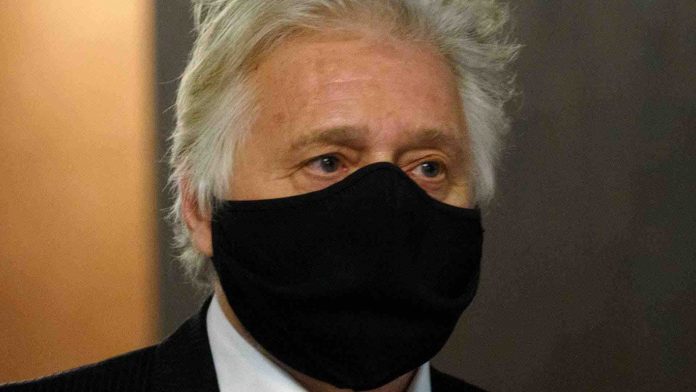Despite finding the testimony of the woman who accused Just for Laughs founder Gilbert Rozon of raping her four decades ago to be credible, a Quebec Court judge acquitted Rozon on both of the charges he was tried on.
While reading from a 30-page decision that broke down the trial in detail, Judge Mélanie Hébert noted the Crown always has a “heavy burden” to prove, beyond a reasonable doubt, that a person committed a crime.
“Even if the court does not believe the version of facts given by Mr. Rozon, it does raise a reasonable doubt. To be clear, that reasonable doubt derives from both intrinsic qualities of the testimony given by Mr. Rozon and the weaknesses previously identified as to the reliability of the testimony of (plaintiff Annick Charette). Considering the existence of reasonable doubt, Mr. Rozon should be acquitted of the accusations against him,” Hébert said.
“An analysis of (Charette’s) testimony demonstrates that she is credible. (Charette) testified in a way that was honest, sincere without bias and without exaggeration. However, this analysis allowed (the court) to notice certain imprecisions existed in her testimony. Some pertained to peripheral elements, but some were difficult to explain.”
Before Hébert delivered the decision, Charette asked to have the publication ban that had been placed on her identity in the case lifted. She worked at a radio station in either 1979 or 1980 when she first met Rozon. She is currently the secretary treasurer general for the Fédération nationale des communications et de la culture, part of the CSN union.
“To conclude,” Hébert said, “the court wants to underline the courage it took (Charette) in testifying. The court reminds (her) that the verdict of acquittal does not signify that the incidents did not happen. It simply signifies that there exists, in the spirit of the court, a reasonable doubt as to the guilt of Mr. Rozon because the (prosecution) did not meet its burden.”
Charette read from a prepared statement as she spoke to reporters after the decision was delivered.
“I think this Tuesday, Dec. 15, will be a dark one for all victims of sexual assault, because I am an example of the limits of the justice system when it comes to sexual violence. I profoundly deplore that the myths and the stereotypes of another era, that were often brought up by the defence, could be echoed in that courtroom. It is a negative message sent by the justice system to victims,” Charette said.
“Finally, to all the victims, I would like to say this: Don’t be ashamed. Despite the disappointment of today, I invite you to denounce (sexual assaults). Things are starting to change.”
During the trial, Charette said she got to know Rozon while she worked at the radio station in the Laurentians, where he would often show up to work on promotional material for businesses he ran, including a festival that would develop into Just for Laughs years later.
She said that one night, while both were working late at the station, they agreed to go out to a discotheque in St-Sauveur together. When they left the discotheque, she said, Rozon offered to drive her home but said he had to pick up documents at his secretary’s home first. She said he invited her into the house and began kissing her. She said she rejected him by insulting him and pushing him away as he ran his hand up her leg.
She also testified that she agreed to sleep over because they agreed to sleep in different rooms and because it was too late to call her father to pick her up. Charette awoke the next morning, she said, to find Rozon on top of her. She said she tried to fight him off of her but gave up because she feared he would assault her.
Rozon testified in his defence and said he awoke to find her on top of him. He testified that she appeared to be in a trance as she straddled him and that he decided to let her have her way with him.
Hébert said the prosecution’s cross-examination of Rozon “simply did not shake his version of the facts. However, it did reveal that Mr. Rozon can sometimes exaggerate his words to support his testimony and that he is more affirmative than his memory allows him to be.”
As he left the courthouse on Tuesday, all Rozon would say to reporters was: “Thank you and good evening.”
































